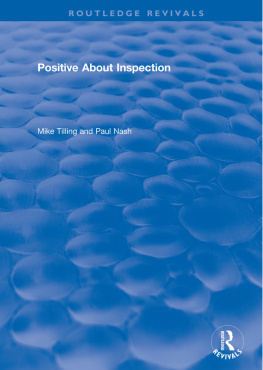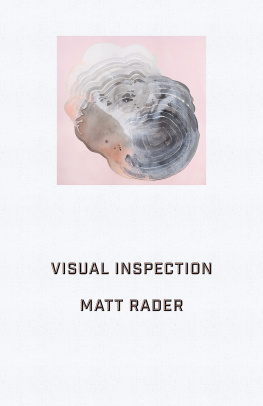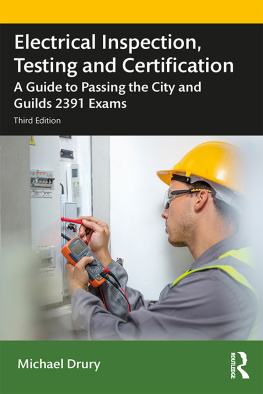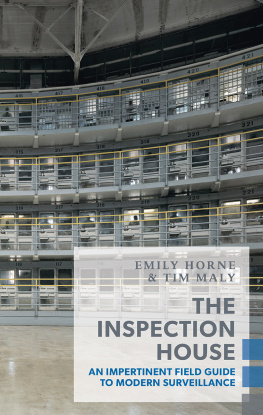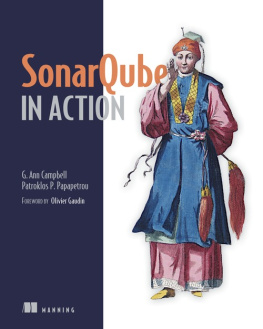Paul Nash - Positive About Inspection
Here you can read online Paul Nash - Positive About Inspection full text of the book (entire story) in english for free. Download pdf and epub, get meaning, cover and reviews about this ebook. year: 2018, publisher: Routledge, genre: Detective and thriller. Description of the work, (preface) as well as reviews are available. Best literature library LitArk.com created for fans of good reading and offers a wide selection of genres:
Romance novel
Science fiction
Adventure
Detective
Science
History
Home and family
Prose
Art
Politics
Computer
Non-fiction
Religion
Business
Children
Humor
Choose a favorite category and find really read worthwhile books. Enjoy immersion in the world of imagination, feel the emotions of the characters or learn something new for yourself, make an fascinating discovery.
- Book:Positive About Inspection
- Author:
- Publisher:Routledge
- Genre:
- Year:2018
- Rating:3 / 5
- Favourites:Add to favourites
- Your mark:
- 60
- 1
- 2
- 3
- 4
- 5
Positive About Inspection: summary, description and annotation
We offer to read an annotation, description, summary or preface (depends on what the author of the book "Positive About Inspection" wrote himself). If you haven't found the necessary information about the book — write in the comments, we will try to find it.
Thit title was first published in 2000: This text helps organizations prepare for inspection by the Training Standards Council. It approaches inspection using two distinct perspectives. The first is a linear account of an inspection through diary entries of inspector and trainer; the second is ten typical encounters during inspection.
Paul Nash: author's other books
Who wrote Positive About Inspection? Find out the surname, the name of the author of the book and a list of all author's works by series.
Positive About Inspection — read online for free the complete book (whole text) full work
Below is the text of the book, divided by pages. System saving the place of the last page read, allows you to conveniently read the book "Positive About Inspection" online for free, without having to search again every time where you left off. Put a bookmark, and you can go to the page where you finished reading at any time.
Font size:
Interval:
Bookmark:
and
Paul Nash

2 Park Square, Milton Park, Abingdon, Oxon OX14 4RN
711 Third Avenue, New York, NY 10017, USA
Product or corporate names may be trademarks or registered trademarks, and are used only for identification and explanation without intent to infringe.
The publisher has gone to great lengths to ensure the quality of this reprint but points out that some imperfections in the original copies may be apparent.
The publisher has made every effort to trace copyright holders and welcomes correspondence from those they have been unable to contact.
- From the Training Standards Council:
- David Sherlock and Helen Peggs and inspectors from the expert reading group:
- Colin Ashton
- Matthew Coffey
- Lesley Davies
- John Grimmer
- Philip Howard
- Barbara Hughes
- Jane Riddell
- Jane Robinson
- From York Business College:
- Margaret Taylor
- From City Centre Training (Northern) Ltd:
- John Weir
- Annie Weir
- Keith Tweddle
- Jackie Adams and the Business
- Admin, team
- Tanya deQuincey and all the team in Cumbria
- From York Consulting Ltd:
- Jo Cutter
- From Access Training Ltd:
- Julie Reay
Introduction
- training and assessment
- trainees' achievements
- resources.
- equal opportunities
- trainer support
- management of training
- quality assurance.
Preparing for inspection
Font size:
Interval:
Bookmark:
Similar books «Positive About Inspection»
Look at similar books to Positive About Inspection. We have selected literature similar in name and meaning in the hope of providing readers with more options to find new, interesting, not yet read works.
Discussion, reviews of the book Positive About Inspection and just readers' own opinions. Leave your comments, write what you think about the work, its meaning or the main characters. Specify what exactly you liked and what you didn't like, and why you think so.

